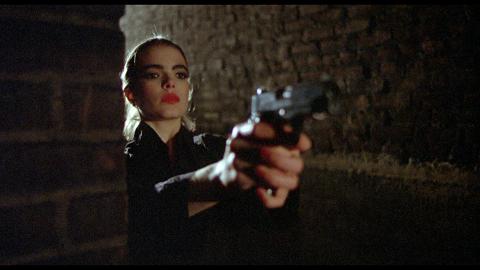UW MADISON'S MAUREEN ROGERS ON 'MS. 45' AND THE RAPE AND REVENGE MOVIE

These notes on Abel Ferrara's Ms. 45 were written by UW Madison's Maureen Rogers, Ph.D candidate and Teaching Assistant in the Department of Communication Arts. Ms. 45 screens as the Cinematheque's first 'Marquee Monday' for the Fall 2014 season at the Marquee Theater at Union South on Monday, September 29, at 7 p.m.
Ms. 45 and the Rape and Revenge Film
by Maureen Rogers
Ms. 45 (1981) marks Abel Ferrara's third directorial feature and third collaboration with screenwriter Nicholas St. John. Since its release, Ms. 45's melange of gore and low-budget stylization, set in gritty pre-Giuliani New York, has made the film a favorite among fans of cult and exploitation cinema.
Ms. 45 stars the 18-year-old Zoe Lund as Thana, a mute seamstress working for a two-bit fashion designer (played by a delightfully smarmy Albert Sinkys) in the Manhattan Garment District. (Lund would go on to collaborate with Ferrara in writing 1992's Bad Lieutenant.) Returning from work one day, Thana is brutally assaulted and raped twice in a span of mere hours. Traumatized and enraged, Thana doles out revenge on her assailants and, as the film proceeds, on the unrelenting array of sexual predators that populate Ferrara's early-1980s downtown Manhattan.
At a brisk 84 minutes, Ms. 45 is quickly plotted and rarely drags. Given the expressive limitations of the Thana character, Lund offers a moving and dynamic performance with impressive range conveyed largely through facial expression. The film also benefits from interesting sound design and music that ranges from expressive use of a tenor sax (a likely influence on Quentin Tarantino's Kill Bill) to synth music more characteristic of the period and genre.
Ms. 45 is also among the most pared down examples of the rape and revenge film, a subgenre of the action revenge genre. Most rape and revenge films involve a similar set of situations and events that include extended scenes of the female protagonist's suffering. The protagonist typically survives the sexual assault(s), and the remainder of the narrative is spent detailing her plotting to kill the perpetrator(s) and finally achieving her revenge. There are a few common variations to this formula; for instance, in some rape and revenge films, as in the Japanese film Lady Snowblood (1973) and Death Wish (1974), family members seek vengeance on behalf of the female victim who is unable to carry out revenge herself. Many rape and revenge films present both the sexual assaults and the acts of revenge as moments of hyperviolent, sexualized spectacle and titillation.
It's worth noting that the rape and revenge plot has been used in a variety of budget levels and production contexts; higher-budget examples include Lipstick (1976), Wild Things (1998), and The Girl With the Dragon Tattoo novel and film adaptations. However, in common parlance, the rape and revenge film is almost exclusively associated with a low-budget, exploitation mode of filmmaking. As such, 1970s and 1980s rape and revenge films, such as I Spit On Your Grave (1978), the Swedish sexploitation film Thriller: A Cruel Picture (aka They Call Her One Eye, 1973), and Ms. 45, are often considered classics of the subgenre. Indeed, in Ms. 45, Ferrara appears to draw significantly from Thriller: A Cruel Picture. Like Thana, Madeleine, the female protagonist in Thriller, is also mute, and there are substantial similarities in sound design and costume.
Ms. 45 is grisly at times and, at other times, playfully vengeful, particularly as Thana begins to fully inhabit her new persona as a killer. Indeed, the ambiguous moral valence of Ms. 45 and other rape and revenge films has been a topic of considerable controversy. On the one hand, some critics and commentators have understood films such as Ms. 45 as tales of female empowerment and patriarchal critique. On the other hand, the rape scenes in these films occupy a good deal of screen time and often depict the sadistic violence of the story in a highly sexualized, often troubling fashion. For some viewers, Thana's inability to speak might further mitigate a reading of Ms. 45 as feminist or politically transgressive, while the film's climax and Thana's fate further muddies the film's politics. Whichever way you understand it, Ms. 45 is a disturbing, entertaining, and controversial film.
